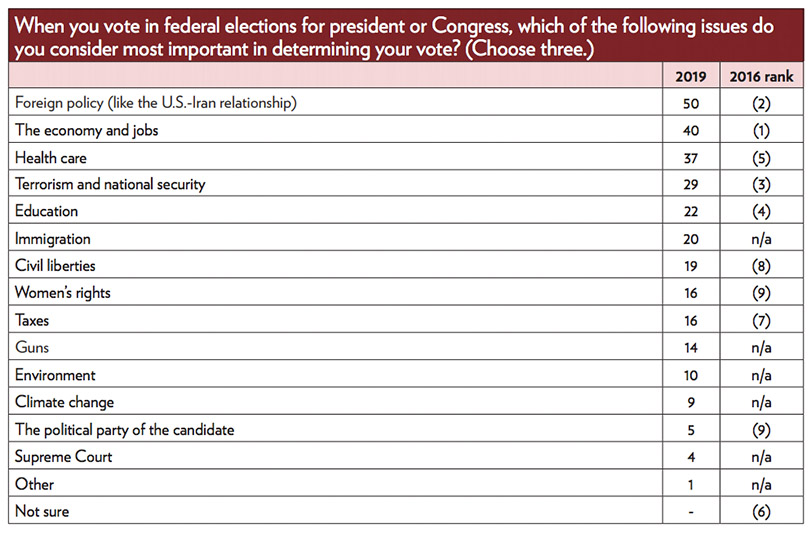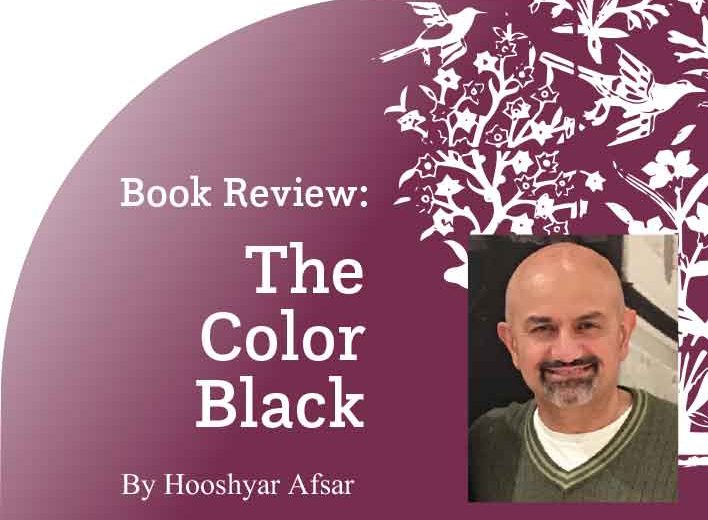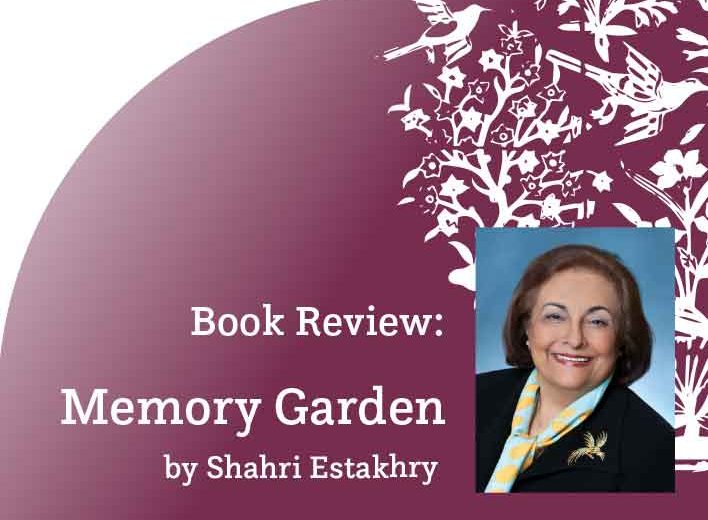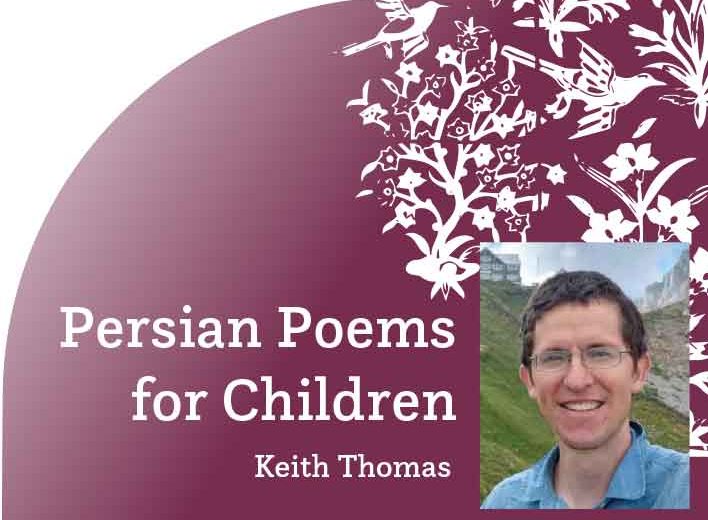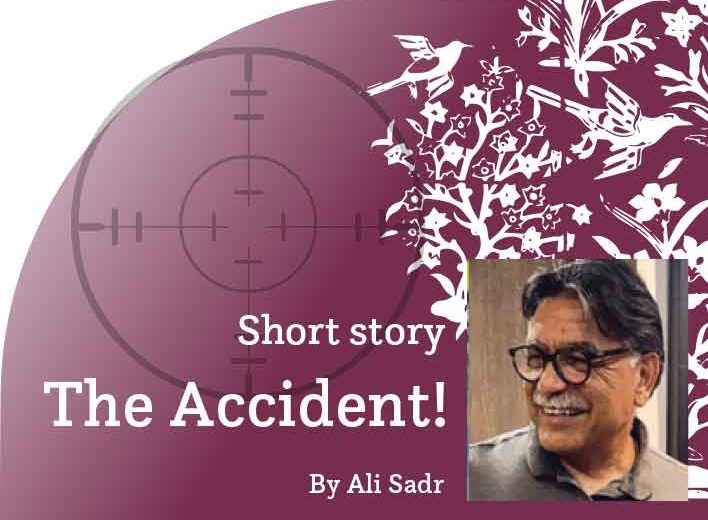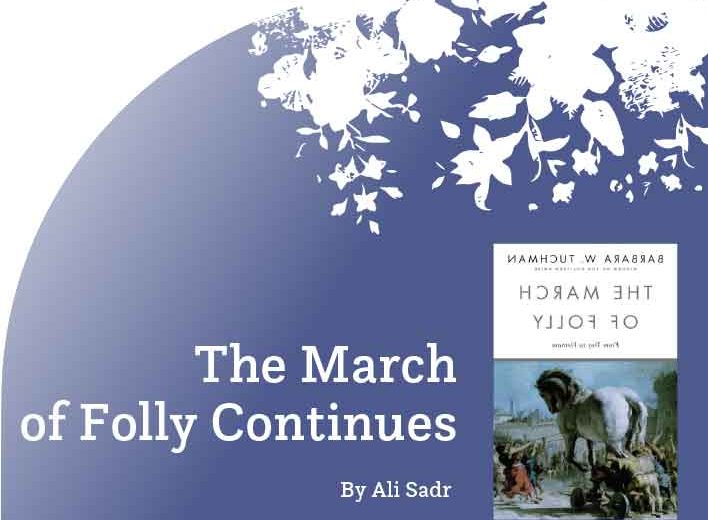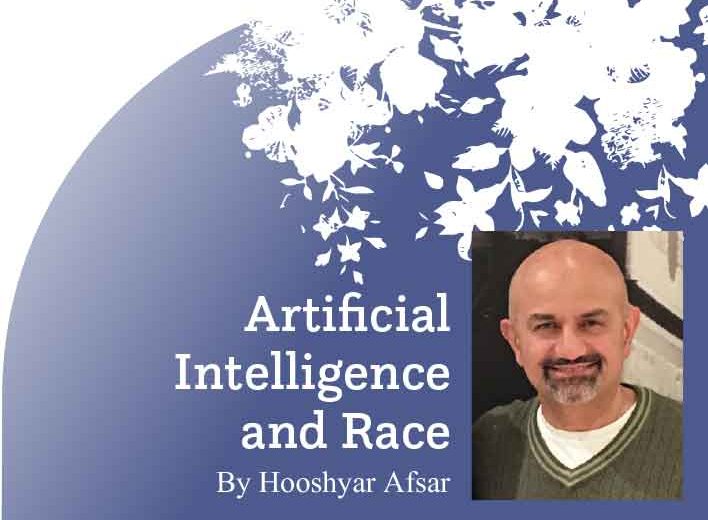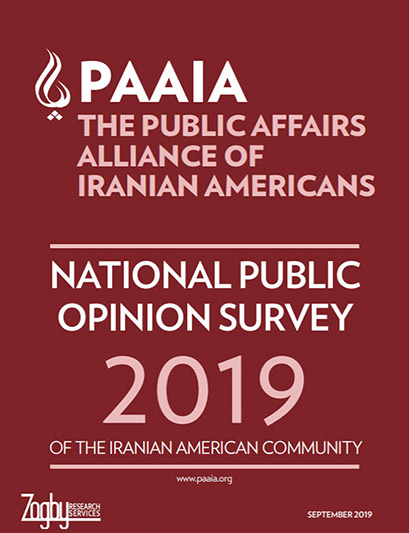
Every year the Public Affairs Alliance of Iranian Americans (PAAIA) conducts a national survey among Iranian Americans about various issues concerning the community. The following is the executive summary of the 2019 survey. We share this information without expressing any opinion. We also recommend reviewing the entire survey at PAAIA’s website, www.paaia.org
Poll shows concerns over discrimination, personal safety, and potential U.S.military conflict with Iran
Contact: Shannon Kuehn
Email: shannon@paaia.org
Washington, DC – Today, the Public Affairs Alliance of Iranian Americans (PAAIA) released the findings of its 2019 National Public Opinion Survey of Iranian Americans, which reveals that tensions in both the wider U.S. society and between the United States and Iran are felt by the Iranian American community.
More than three-quarters of respondents are worried about increased discrimination against Iranian Americans, and (63%) report that they have personally experienced or know someone who has experienced discrimination. Even more concerning, 61% of respondents are concerned about their personal safety and the safety of other Iranian Americans.
Reflecting anxieties over policies that stigmatize the Iranian American community, President Trump’s Travel Ban continues to face strong opposition in the Iranian American community with more than three quarters (76%) saying they are opposed to the policy. More than half of Iranian Americans (53%) say that the ban has prevented attendance at family events (weddings, funerals, graduations or gatherings for family emergencies like illnesses.
With respect to the rising tensions between the U.S. and Iran, sixty-four percent (64%) are worried that military conflict is now more likely than not. More than six in ten (62%) would oppose military strikes against Iran. The opposition to, or indecision about, such an action is rooted in concern about the potential civilian casualties (83%) and the belief that strikes will be ineffective and encourage Iran to develop nuclear weapons.
Promoting human rights and democracy in Iran (54%) continues to be the most important issue for the Iranian American community related to U.S.-Iran relations. Allowing Americans to invest in Iran to create employment opportunities for the Iranian people (38%) remains the second most important issue, while preventing military conflict (27%) and promoting regime change (25%) follow closely in importance.
When asked which outcome of the current administration›s maximum pressure policy seems more likely, almost two-thirds (63%) believe the renewed sanctions will harm the Iranian people and increase support for hardliners’ anti-American sentiment.
“Given the ongoing tensions between the two countries, it is not surprising that the U.S.- Iran relationship has become the most important issue for the community, rising above domestic issues and becoming the number one consideration for Iranian Americans when voting in federal elections,” said PAAIA›s Executive Director, Leila Austin. “However, when contemplating priorities and goals, the community desires deeper political participation within the United States, including electing Iranian Americans to public office and increasing the capacity of the Iranian American community to influence policy.”
PAAIA’s annual surveys are integral to better understanding the Iranian American community, as the only poll of the community that has an on-going collection of accurate scientific data.
PAAIA commissioned Zogby Research Services (ZRS) to conduct this telephone survey of Iranian Americans.
ABOUT PAAIA: The Public Affairs Alliance of Iranian Americans, PAAIA, Inc., is a nonprofit, nonpartisan, nonreligious 501(c)(4) organization that serves the interests of Iranian Americans and represents the community before U.S. policymakers and the American public at large.
Executive Summary
From August 5–17, 2019, Zogby Research Services conducted a national telephone survey of 400 Iranian Americans on behalf of PAAIA; this year’s survey results are presented below.
A few strands emerge from the responses that are worth highlighting. The tensions in both the wider U.S. society and between the United States and Iran are clearly being felt by the Iranian American community. Respondents share their concerns about discrimination and personal safety, opposition to the travel ban, and fears about a potential U.S. military conflict with Iran. When contemplating priorities and goals, the community advocates for deeper political participation within the United States, including electing Iranian Americans to office and increasing the capacity to influence policy.
A brief summary of the findings includes the following points:
• Connections between the Iranian American community and Iran are strong, with 41% communicating with family and friends in Iran at least several times a week. This communication has been transformed over the last decade, from reliance on phone calls to the utilization of a wide variety of services and apps like Skype, Telegram, and Whatsapp as well as social media networks to keep in touch.
• The experience of and concern about discrimination based on their ethnicity and country of origin remains high among Iranian Americans. More than six in 10 have either faced discrimination themselves or know another Iranian American who has had this experience. More than seven in 10 are concerned about increasing discrimination because of the current political climate in the United States. Worse still, 61% of respondents are concerned about their personal safety and the safety of other Iranian Americans.
• There is strong opposition to the travel ban, with 70% saying they or their family and friends have been impacted by it. The most frequently experienced impacts are preventing attendance at family events and gatherings for family emergencies (53%), preventing tourism (52%), and separating families or keeping them apart (44%).
• There is a strong desire for building political power and influence in the community. When asked about goals for their community’s civic or advocacy organization, the top choice is enhancing Iranian American participa-tion in U.S. politics and increasing the influence of the community. Among issues affecting their community in the United States, Iranian Americans rank “helping Iranian Americans get elected to political office and increasing the community’s political influence” at the top.
• The U.S.-Iran relationship has become the most important issue for the community, rising above domestic issues facing Iranian Americans (like civil rights) as well as those facing all Americans (like jobs or health care). And foreign policy including the U.S.-Iran relationship is ranked first among issues the community will consider when voting in federal elections, outranking the economy and jobs, national security, education, and health care.
• Almost seven in 10 of the survey respondents say they will probably (19%) or definitely (50%) vote for the Democratic candidate for president in 2020, while 21% say they will probably or definitely vote for President Trump’s re-election. These numbers mirror the ratings of Trump’s handling of U.S.-Iran relations, with 22%saying it is excellent or good and 77% saying it is fair (9%) or poor (66%).
• Promoting human rights and democracy in Iran and lifting the U.S. trade embargo continue to be the issues related to U.S.-Iran relations of most importance to the community. Preventing a U.S. military strike ranks third. Promoting regime change is the number one issue for Republican respondents but ranks near the bot-tom for Democrats.
• There is significant concern among Iranian Americans about a military conflict between the United States and Iran, with 64% saying they think it is more likely than not. Only 9% would support U.S. military strikes on Iran, and the opposition to or indecision about such an action is rooted in concern about potential civilian casualties (83%) and the belief that strikes will be ineffective and encourage Iran to develop nuclear weapons (63%).




